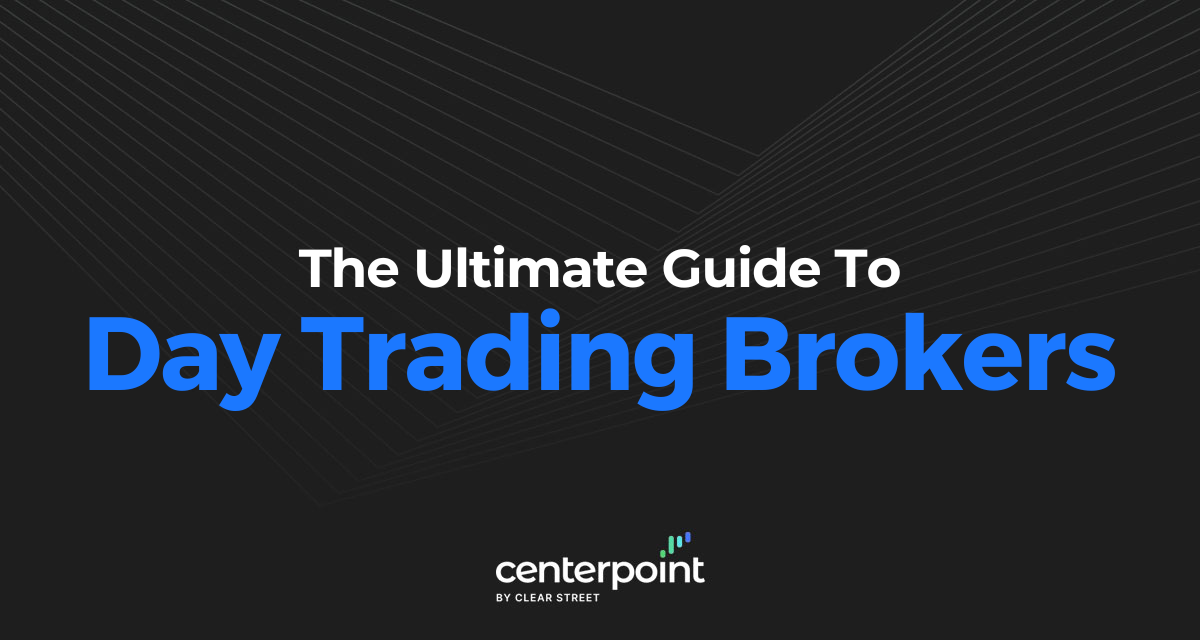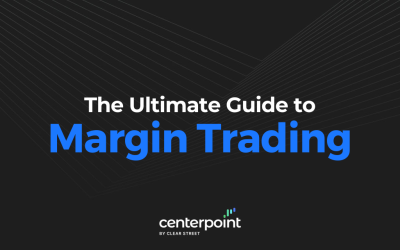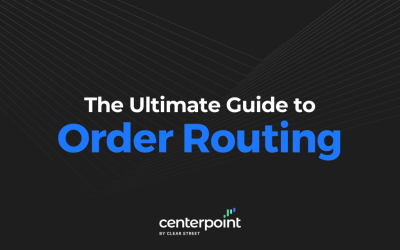What Exactly Is A Day Trading Broker?
Publicly listed stocks can only be traded through a licensed broker or brokerage. Brokers enable clients, who may be investors or traders, to participate in the stock market by executing or enabling the execution of trades on behalf of their clients. Contrary to what the marketing campaigns assert, not all brokers evenly accommodate every type or style of customer. It’s prudent to understand the contrasts between popular “one-size-fits-all” online brokers and high caliber day trading brokers as they can have a very material impact on performance and efficiencies.
Role Of A Broker
The broker or brokerage is the gateway for investors and traders to participate in the stock market. This article is in reference to brokerages also referred to as broker-dealers or brokers, not individual stockbrokers.
A broker provides many basic services to clients, including real-time (and delayed) market data, extending margin accounts, charting, stock borrows (for shorting) and trading capabilities. The depth of the services varies depending on the type of broker: retail or day trading (also referred to as direct market access).
Retail Brokers
Retail brokers will offer plenty of additional services including research, banking and wealth management services including checking and savings accounts, debit cards, retirement planning and human registered investment advisors (RIAs).
Day Trading Brokers
Day trading brokers accommodate a very specific clientele that seek only functions to enhance trading performance including stable robust trading platforms that include direct and personalized order routing, advanced charting, hot keys, embedded short locate functions with prompt access to hard to borrow (HTB) inventory and instantaneous customer service.
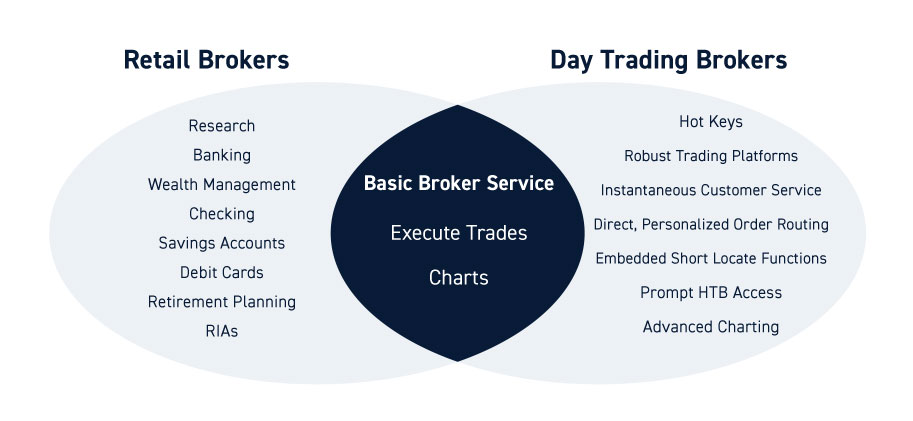
Investors vs. Day Traders
Brokers cater to two types of customers. The majority of customers fall into the investor category.
Investors
Investors are acclimated to passive and long-term holding periods using traditional buy and hold portfolio strategies. They tend to make less than 20-trades per-quarter and seek long-term growth and income. Investors aren’t interested in the minute-to-minute price action of their holdings and instead choose to base their activity on company fundamentals. Investors enjoy the convenience of having banking functionality including checking, savings and retirement accounts. Since they don’t watch the day to day action of their portfolios, they don’t scrutinize the fills on executions or intraday price swings.
Day Traders
Day traders have an affinity for actively trading price action often stalking minute-to-minute price swings making short-term intraday trades. Despite the conventional image of reckless overtrading cowboys, day traders are generally a risk averse group. Since risk can be defined as exposure in terms of holding share size and holding time, the very objective of day trading is to eliminate exposure by zeroing out positions by the end-of-the-day to avoid overnight risk/exposure. To optimize performance, day traders need high caliber, sophisticated tools for finding, tracking and managing trades quickly and efficiently.
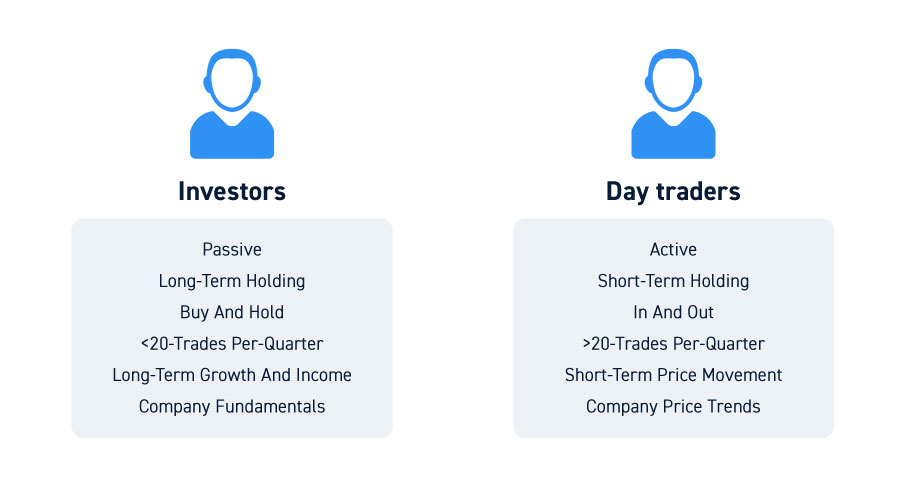
What Do Day Traders Need?
Optimal performance for day trading can be segmented into three key components:
Speed
Speed is the name of the game when it comes to decision-making and executions. As they say, the shortest distance between two points is a direct line. Day traders compete for speed in every area ranging from speed of information to speed of execution. In the brokerage world, day trading brokers offer certain speed advantages you won’t find at retail brokers. Direct routing enables instantaneous fills and fast confirmations. Hot keys to shave keystrokes and seconds from manual entry keeps the workflow frictionless.
Quality Executions
Quality executions are essential for day traders. These executes are attained with prompt and favorable fills both as a taker and maker of liquidity. A quality execution can directly impact the profitability of a trade in two ways. First (and most obviously), it can result in a better fill price that may increase the trader’s profit margin. Second, having access to quality routing/execution tools can make the difference between participating in a trade and sitting on the sidelines. Subpar order flow management (on the brokerage side) may result in order delays that leave orders unfulfilled in periods of extreme volatility.
Day trading brokers offer direct access to specific ECNs and ATS allow for more efficient price discovery akin to taking side roads to bypass main street traffic jams.
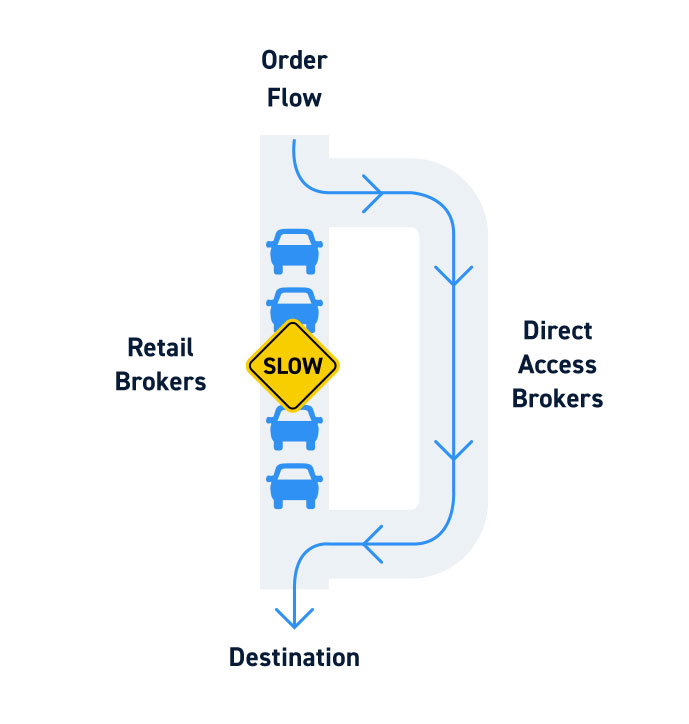
Traders also need tools that materially enhance performance, not fluff. Retail trading platforms are resource hogs that often pack so many ‘bells and whistles’ that are barely usable. The tools that help day traders include advance real-time charts with indicators, direct order routing with configurable intuitive smart routing, algorithmic adaptive and conditional orders (i.e. bracket, conditional, trailing, midpoint, basket), in-platform short locate functions and robust real-time price and pattern set-up scanners.
What Day Trading Brokers Offer
Day traders are a different breed of clientele with very specific needs. Day trading brokers were created to accommodate these needs with ever evolving offerings. Here’s what day trading brokers offer:
Direct Market Access
Direct Market Access places control in the trader’s hands. Traders can route their orders directly to market rather than relying on the mercy of inhouse market makers or third-party liquidity providers that put their own interest ahead of the trader’s. Retail brokers are notorious for prearranged order flow agreements with market makers that often take the other side of customer’s trades. Direct order routing empowers traders with the choice of where to route their orders, giving them control of transparency and fills. Traders can hide their transparency with hidden and iceberg orders through various ECN limit books to minimize market impact and prevent stifling momentum.
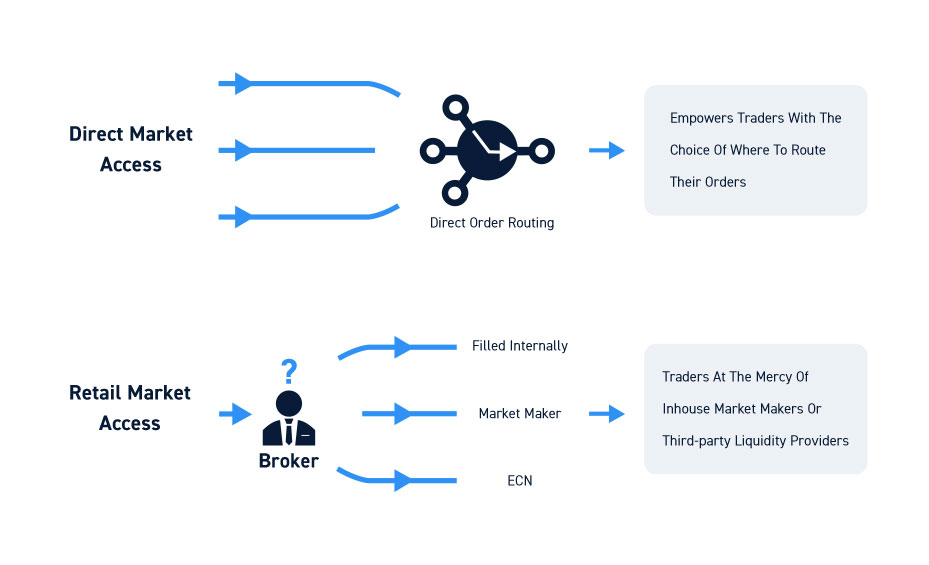
Superior Platforms
Superior platforms are built for speed with highly refined tools catering to traders including sophisticated level 2 windows packed with order entry and routing options. Advanced charting that pipes data pre and post-market to enable price action interpretation. Price and news scanners provide a constant flow of trade ideas around the clock. Multi-account support and multi-channel access via voice, chat/messenger and e-mail provides traders prompt attention to any issues.
Short Inventory
Short inventory and access to hard-to-borrow (HTB) stocks for shorting purposes are a good measure of a day trading broker’s caliber. Having a large shortable inventory with the ability to promptly request short locates seamlessly in a frictionless manner through the platform sheds both time and aggravation. Having a network on third party locate providers bolsters short inventory capacity giving its day trader clientele a superior edge over competitors.
Leverage
Leverage cuts both ways depending on the trader. Disciplined traders respect the power of leverage. They understand that margin is a tool best used to capitalize on temporary high probability situations with the full intent of zeroing out exposure risk sooner rather than later. Day trading brokers offer leverage as a tool for sophisticated traders.
Flexible Commissions
Flexible commissions offered through a sliding per-share structure incentivize traders to procure cheaper commissions from increasing trading volume. Additional perks like discounted or free software and service fees are additional incentives. Per-share pricing enables seasoned traders to reap pass-through rebates when providing liquidity into buyers and sellers as well as the ability to scale in and out of positions to gain optimal average position prices.
Experienced Support
Experienced support can make a world of difference for traders. Day trading brokers have experienced customer support teams that specialize in providing true trading support. Many of these team members are experienced traders that are well versed in all aspects of trading including routing, execution, regulations and expertise in the nuances of their trading platforms. They know their clientele and deal with traders all day long.
Intuitive and highly relevant support cuts down time especially when it pertains to trade executions where minutes count. Nothing is more frustrating than trying to explain a trading issue to an outsourced support representative in a third world call center reading back template responses and rebuttals.

